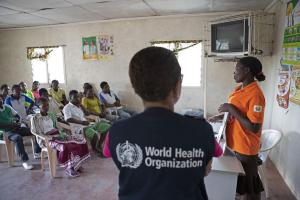Urgent action needed to accelerate mental health progress in African region
Brazzaville – The African region has made progress over the past decade to strengthen mental health systems, including investments to improve care, health workforce as well as national policies to steer the delivery of vital services. However, the pace of the progress is slow and further efforts are needed to address mental health challenges and ensure well-being.
Notable advancements in the region include a 14% improvement in the ratio of mental health specialists to population in the six years to 2020, as well as the introduction of mental health care training for primary health care workers in 79% of African region countries as of2020. Government expenditure on mental health in the region has also increased, from US$0.1 to US$0.46 per capita between 2014 and 2020.
In addition, 28% of countries in the World Health Organization (WHO) African Region have integrated mental health and psychosocial support into their preparedness plans for future health crises, while three-quarters have a national mental health policy, and 57% have mental health laws compliant with international human rights instruments – up from 31% in 2014.
Despite the progress, challenges remain in provide adequate health care services and programmes for mental, neurological and substance use. The challenges include poor awareness, stigma around mental health; limited structured financial investment to address mental, neurological and substance use problems; as well as ineffective integration of mental health into primary health care. Others are poor multisectoral collaboration to address psychosocial risks and drivers of mental ill health and weak mental health information systems and limited mental health research in the region.
“Although countries are making positive steps forward to address mental health challenges, urgent action is needed to acceleration action to better protect and promote mental health,” said Dr Matshidiso Moeti, WHO Regional Director for Africa. “We’re working closely with countries strengthen action for comprehensive response to mental health and enable transformation towards better mental health for all.”
This year, World Mental Health Day is being marked under the theme “Mental Health at Work” to highlight the vital connection between mental health and work. Social determinants of health such as work-related stress from discrimination, poor renumeration, harassment and bullying, and feeling a lack of control or autonomy can pose a risk to mental health.
Only eight of the 47 countries in the WHO African Region have work-related mental health prevention and promotion programmes in place and only three have active collaboration between government mental health services and ministries or departments of labour/employment.
To improve access to services, WHO is supporting countries to decentralize and integrate mental health at the primary health care level and integrate mental health into other health services such as early childhood development programme, which is currently being rolled out in Kenya, Mozambique and Tanzania. The Organization is also working with governments to adopt rights-based approach to mental health policy, with Ghana and Zimbabwe already implementing the programme. A joint WHO-UNICEF child and adolescent health is also being rolled out in Cote d’Ivoire and Mozambique.
Governments are also taking initiatives to strengthen mental health services. In 2022, African countries endorsed the Regional Framework to Strengthen the Implementation of the Comprehensive Mental Health Action Plan 2013 to 2030 in the African Region in which they called for investment in multisectoral coordination, collaboration and partnerships for mental health (including with workers, their representative and employers); aggressive evidenced-based suicide prevention; fighting stigma; adopt policies and legislative reform in line with international human rights standards among other measures to comprehensively address mental health challenges.



